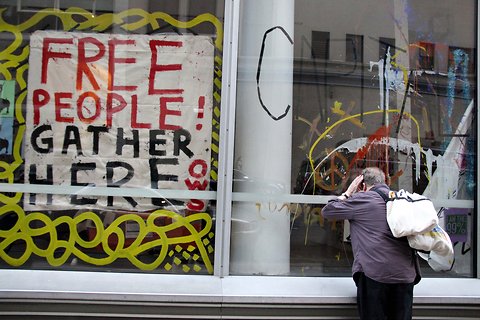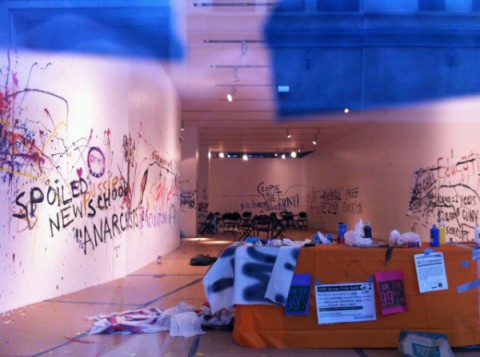Much of New York City may be having a hard time getting used to the presence of protesters, but at the New School, the progressive liberal-arts bastion in Greenwich Village, occupation is a semiregular occurrence.
And on Thursday afternoon, as thousands of Occupy Wall Street protesters marched from Union Square to Foley Square, roughly a hundred New School students veered off, rushed the university’s study center at 90 Fifth Avenue and declared the school to be occupied once again.
It was the New School’s third occupation in four years, and in stark contrast to 2009, when the university’s president at the time, former United States Senator Bob Kerrey, called in the police to arrest student protesters, the university’s administration is fine with it.
“As long as they’re not disrupting the educational functions of the university they can stay,” the university’s president, David E. Van Zandt, said Thursday. “It’s a tough time for students right now, and we’re aware of that. These are big social issues.”
After entering the space, protesters asked those present to leave if they did not want to participate in the occupation. Then they covered the windows and hung banners outside with slogans like “Annihilate capitalism! Retaliate and destroy,” and “People power not ivory tower.”
The occupation followed a rally in Union Square Thursday afternoon where students from Cooper Union, New York University and the New School and other colleges spoke out against what they called high costs and weak financial-aid systems.
Dacia Mitchell, a 30 year-old doctoral student at New York University holding a toddler in her arms, said at the rally, “I’m here with my 2 year-old because I can’t afford child care. I cannot say I haven’t received any support. I get a stipend of $200 per semester which affords me one week of day care if I’m lucky.”
Tuitions at the New School vary depending on the division, but often approach $20,000 per semester.
After the students occupied the study center, police officers initially barred others from following the protesters, but eventually Dr. Van Zandt told them to allow people with valid student identification to pass through, even those who attend other universities.
The study center is on the second floor of a larger apartment building. The university leases the space, and Dr. Van Zandt said that although he had no intention of ousting the students, the building’s owner, 90 Fifth Owner L.L.C., could call the police in if it deemed the protesters hazardous.
Many protesters declined to speak to reporters because they had not yet collectively decided how to interact with the press. Protesters also barred reporters from entering the occupied space.
Chris Crews, a graduate student studying politics at the New School, said that the scene inside was calm. Students were gathered in general assemblies. He also said that the group did not yet have many provisions like sleeping bags for a longer stay, but they would gradually collect them.
By Friday morning, the number of occupiers dipped to about 30, but many had left to run errands and collect supplies for their return later in the day.
“The most encouraging thing is that the administration and students haven’t had a serious confrontation yet,” Mr. Crews said.
In a statement released online, the occupiers said that universities create social inequality because they are so expensive.
“Skyrocketing tuition costs at public and private institutions deny us access to higher education and saddle us with crushing debt,” the statement read. “We will reclaim this elite space and make it open to all.”
The occupiers plan to hold another general assembly on Friday afternoon where they seek to draw more students from neighboring universities.
“The hope is that the space at 90 Fifth can be a jumping-off point for student activism throughout the city,” Mr. Crews said. “This could be a one-off, or it could be the beginning of a new wave of student occupations.”














 Advance The Struggle
Advance The Struggle